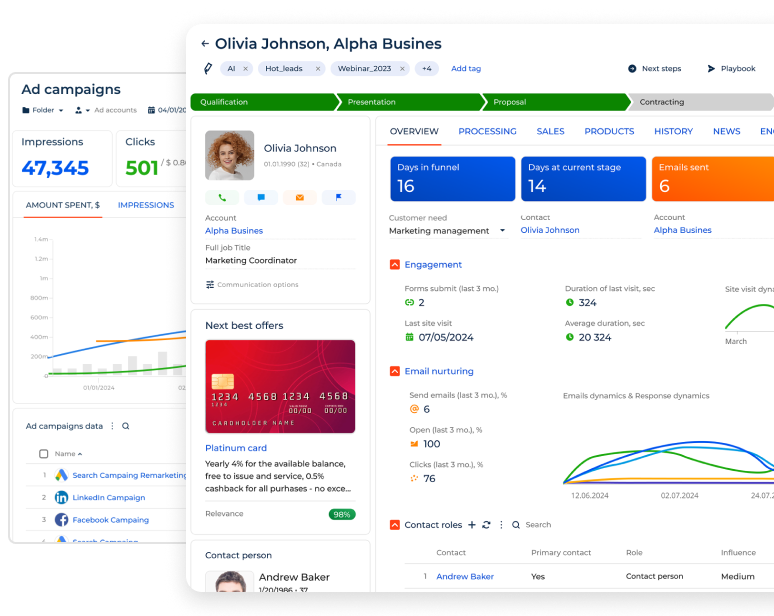-
No-Code
Platform
-
Studio
No-code agentic platform delivering the fastest time-to-value and the highest ROI
-
Studio
-
AI-Native CRM
CRM
-
AI-Native CRM
New era CRM to manage customer & operational workflows
CRM Products -
AI-Native CRM
- Industries
- Customers
- Partners
- About
How Much Does a CRM Cost? A Comprehensive Guide & CRM Pricing Comparison in 2026
Updated on
May 30, 2025
19 min read
Enhance Business Ops with Creatio’s Agentic CRM

Over the past two decades, the CRM market has evolved from a niche software segment into a foundational business technology. Valued at just a few billion dollars in the early 2000s, it reached $73.4 billion in 2024 and, according to Grand View Research, is projected to surpass $100 billion by 2027.
As this industry grows and more vendors enter the market, businesses can now choose from a wide range of CRM platforms to enhance customer engagement and drive growth. However, with so many options available, finding the right CRM can be a real challenge, especially when pricing ranges from $15 to over $300 per user/month, often for tools with similar core features.
In this guide, we will discuss the key factors that shape CRM pricing, explain which capabilities drive cost, and help you understand the most realistic CRM cost for your business. You’ll also learn how to align your CRM software with your budget and ROI goals, ensuring you pay only for the features that truly deliver value.
Key Cost Factors of CRM Software
CRM pricing can often feel confusing or misleading, mainly because what you see on a pricing page rarely reflects the full cost. While clients tend to focus on visible elements like user-based pricing, plan tiers, or feature sets, the total cost is shaped by a much broader set of technical, operational, and business factors.
To understand if the CRM price matches its value, make sure to check these key factors:
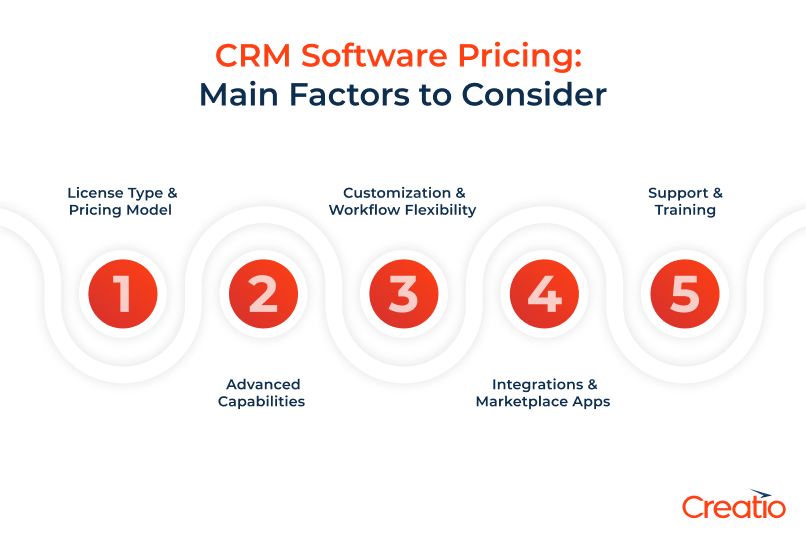
License Type & Pricing Model
The licensing structure is one of the fundamental factors shaping CRM pricing. Most CRM vendors charge based on how many people use the system or how much data is stored and processed. The pricing model you choose — and how your usage grows over time — will significantly influence your overall CRM cost.
Key elements include:
- Pricing structure: CRM platforms may charge per user, per contact, or offer a flat-rate license. Per-user pricing is most common but can add up quickly as your team grows.
- Data storage: Some vendors include limited storage in each plan and charge extra once that threshold is exceeded.
- Usage limits: Lower-tier plans often charge for elements like the number of emails, workflows, or API calls, with higher usage unlocked in premium tiers.
- Billing cycle: Paying annually typically comes at a discount compared to monthly subscriptions, which offer more flexibility.
- Plan tiers: Most CRM systems offer tiered packages (e.g., Starter, Professional, Enterprise), with pricing based on feature access, customization capabilities, and support level.
- Core CRM Features
Core features play a key role in both the cost and long-term value of a CRM platform. While most CRMs include essential tools, pricing often increases when you need access to more advanced or specialized features available as paid upgrades or require additional third-party tools.
When evaluating the key features of CRM software, it’s important to check:
- Included features: Standard plans typically offer core functionality like contact management, lead and opportunity tracking, pipeline management, workflow automation, deal and campaign management, service operations, and basic AI support.
- Paid add-ons: Some platforms charge extra for features such as campaign automation, advanced analytics and custom reports, or AI enhancements — even if they appear to be part of the core offering.
Understanding which features are bundled and what’s gated behind a higher-tier plan will help you avoid overspending and ensure you choose the right CRM solution to support your team’s actual needs.
Advanced Capabilities
Many CRM platforms increase overall pricing or charge extra for advanced features beyond basic functionality. These tools are designed to support more complex workflows, deliver deeper insights, and offer greater flexibility, which is why CRM pricing can vary from $15 to over $100 per user/month, depending on what's included.
Advanced features that often drive up CRM costs include:
- Sales forecasting, custom reporting, and customer scoring
- AI-powered capabilities like predictive insights, generative content, or next-best-action suggestions
- No-code development tools for building custom workflows or apps
- Industry-specific modules and deep customization options
These advanced capabilities are often provided as part of the base offering. For example, Creatio offers no-code tools and AI features across all tiers, which allows businesses to get long-term value without add-on spending on tools or software upgrades.
Customization & Workflow Flexibility
The overall cost of a CRM subscription also depends on how much customization the platform allows. While many businesses can operate with a basic configuration, companies with complex or evolving processes often require deeper customization to align the system with their workflows, which impacts the CRM pricing.
Lower-cost platforms typically offer limited flexibility, while more advanced CRMs support custom modules, dashboards, and process automation. The more tailored your setup, the higher the overall cost, particularly if implementation requires technical teams or third-party consultants. However, some CRM vendors include integration support and ongoing consultations in their plans, which can be a worthwhile investment to maximize the platform’s value and long-term performance.
Integrations & Marketplace Apps
Most CRM platforms include out-of-the-box integrations with commonly used tools like email, calendars, marketing platforms, and document storage systems. For more complex use cases — such as connecting to ERP, billing software, or industry-specific platforms — businesses may need third-party connectors (like Zapier or MuleSoft), which often come with their own licensing or usage-based fees. Additionally, many CRMs offer app marketplaces with optional add-ons to extend the capabilities of your platform, which can be priced separately.
Support & Training
Most CRM plans already include basic support, provided through documentation, knowledge base, email, or chat assistance. However, larger organizations with complex workflows often need more advanced services for CRM integration and ongoing configuration, which is offered through premium plans or as paid add-ons. These may include dedicated success managers, hands-on onboarding, technical assistance, and customized training sessions, which also can significantly increase the overall cost of CRM implementation and maintenance.
How Much Does It Cost to Implement a CRM System?
For many CRM platforms, implementation and support are not always included in the license fee. While these costs may seem minor at first, getting your system up and running may range from barely any costs to over $150,000, depending on the scale and complexity of your rollout. Enterprise CRM implementations are typically more expensive due to larger data volumes, more advanced configuration needs, and broader user training across departments.
Some common factors that may increase costs for CRM implementation are:
- System Setup and Configuration - Setting up users, roles, pipelines, data fields, and workflows.
- Data Migration - Migrating customer records, historical data, attachments, and custom fields from legacy systems or database records. The process can be more time-consuming and costly if the data needs to be cleaned, deduplicated, or restructured for CRM compatibility.
- Third-Party Integrations - Connecting your CRM to ERP, automation tools, billing, communication tools, or industry-specific software may require middleware, API development, or professional integration services — all of which add to the cost.
- Customization and Workflow Development - Tailoring the CRM to your internal processes, including approval chains, custom objects, and specialized reporting logic.
- Training, Support, and Change Management – Setting up training sessions, documentation, and self-service tools to ensure successful adoption. Also covers long-term support and internal change coordination across teams.
Due to their rigid architecture and integration complexity, CRM implementation costs are typically higher for legacy systems. Modern no-code CRMs, on the other hand, are easier to configure, more adaptable, and faster to deploy, which allows businesses to reduce technical effort, optimize costs, and speed up time-to-value.
CRM Pricing Comparison: A Quick Overview
CRM price matters, but the platform’s value matters most. While cheaper CRM plans may cover only the basic functionality, platforms that include automation, AI, or advanced customization for a slightly higher cost often provide better long-term efficiency and ROI. So, instead of focusing on the cost alone, try to find the right balance between price and CRM capabilities.
Based on our analysis of the most popular CRM systems, here’s what businesses can generally expect to pay for CRM software in 2025:
- Small businesses / teams: $10-$30 per user/month Medium businesses / teams: $40-$100 per user/month
- Larger businesses / teams: $150 to $1,000+ per user/month
CRM Provider | Starting Price | Plan details | Free Trial |
| Creatio | Starting at $40 per user/month | 3 plans for different needs: Growth, Enterprise and Unlimited | Yes |
| Salesforce | Ranging - $25 per user/month (small teams) or $100 for large teams | Only 2 plans: Starter or Pro Suite | Yes |
| Zoho CRM | Starting at $20 per user/month | 4 plans: Standard, Professional, Enterprise, Ultimate | Yes |
| HubSpot | Starting at $20 per user/month | 3 plans: Starter, Professional and Enterprise | Yes |
| Microsoft Dynamics 365 | Starting at $65 per user/month | 3 plans: Professional, Enterprise and Premium | Yes |
| Freshworks | Starting at $9 per user/month (sales and marketing) and $35 per user/month (customer service) | 3 plans: Growth, Pro and Enterprise – for Sales and Marketing, and a similar bundle for Customer Service | Yes – for Marketing and Sales |
| Pipedrive | Starting at $19 per user/month | 5 plans: Essential, Advanced, Professional, Power, Enterprise | Yes |
| LeadSquared | Starting at $1,200 per account (marketing) and $40 per user/month (sales) | 2 plans: Pro and Super | No |
| ZenDesk | Starting at $25 per agent/month | 4 plans: Support Team, Suite Growth, Suite Professional, Suite Enterprise | Yes |
* pricing plans last updated in May 2025
Most Popular CRM Solutions: Pricing & Value Compared
So far, we’ve explored CRM pricing models, core features and considerations. Now let’s dive into specific platforms, comparing pricing, capabilities, and value, to help you choose the right CRM solution for your business.
Creatio
Creatio is a comprehensive CRM suite for sales, marketing, and customer service automation, all integrated on a unified no-code platform and enhanced with advanced AI capabilities. It empowers organizations to manage the entire customer journey, enhance employee productivity, and streamline complex business processes with ease.
With Creatio CRM, sales teams can track every lead and deal, forecast revenue, and collaborate more efficiently to close opportunities faster. Marketing teams can launch personalized campaigns across multiple channels, segment audiences, and measure performance – all within one platform. Meanwhile, customer service teams can effectively manage support cases, respond faster through multiple channels, and solve issues more efficiently using a centralized, AI-powered workspace.
Moreover, Creatio’s high-level customization, powered by no-code approach and AI automation, makes it adaptable for various industries, workflows and use cases. With its composable architecture, businesses can deploy Creatio products as a single CRM bundle or as standalone solutions for Marketing, Sales and Service to meet their exact needs. Creatio also provides 700+ ready-to-go solutions, connectors and templates for popular business operations and vertical-specific use cases through its Marketplace.
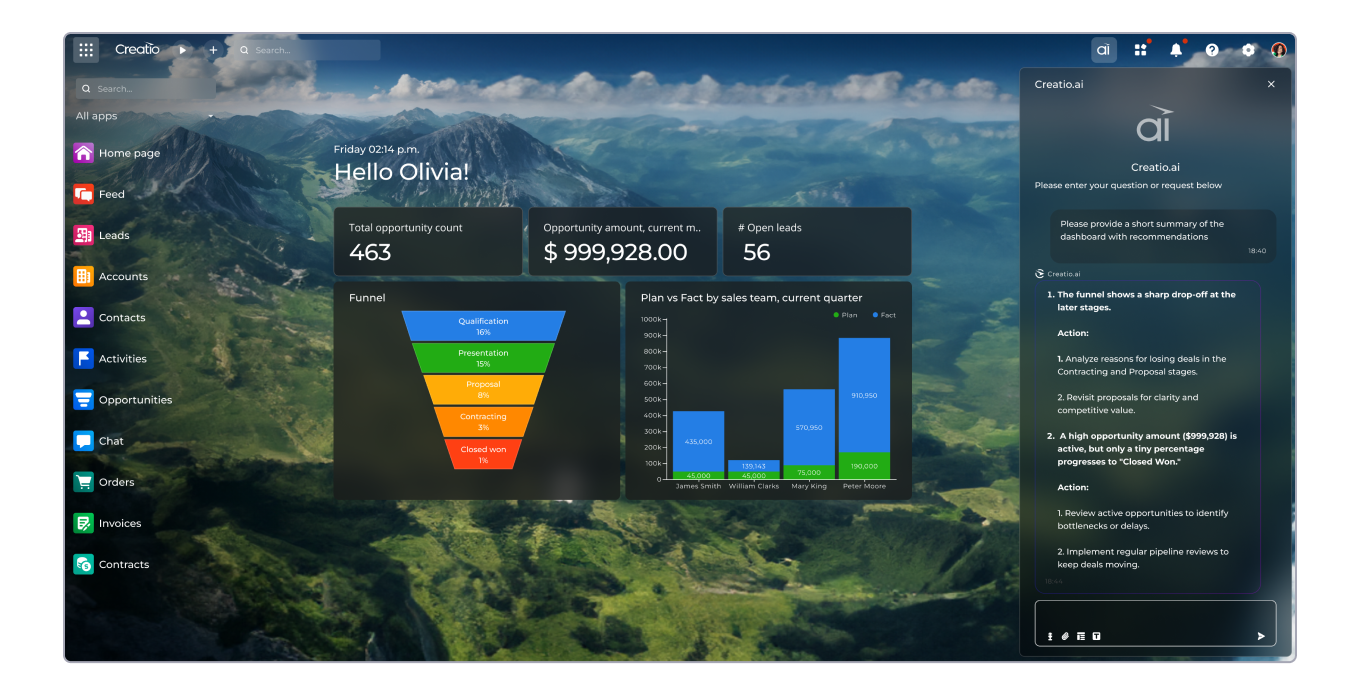
Pricing Plans:
Creatio CRM offers a composable pricing model that allows businesses to pay only for the products they use. The core Creatio platform has three plans:
- Growth ($25 per user/month) – provides automation to SMB clients
- Enterprise ($55 per user/month) – enables full-scale automation for corporate and enterprise needs
- Unlimited ($85 per user/month) – delivers limitless automation for advanced enterprise scenarios
Based on their current needs and strategic goals, businesses can deploy CRM products -Sales, Marketing, and Service, which are priced at $15 per user per month and can be purchased separately or as a complete suite.
Sales ($15 per user / month) | Marketing ($15 per user / month) | Service ($15 per user / month) |
| An AI-powered sales automation product to manage your customer data, automate lead and opportunity workflows of different types, run sales forecasts, manage contracts and documents, track orders and invoices, and boost sales collaboration. | An AI-native end-to-end marketing automation product to deliver a holistic customer view, manage segmentation, run omnichannel marketing campaigns, orchestrate a complete lead cycle, streamline event management, track the efficiency of digital campaigns, and boost collaboration among multiple teams. | An intelligent full-cycle service product to manage cases and customer requests of different types, provide service reps with consolidated agent desktop and robust productivity tools, organize omnichannel communications, manage different SLAs and queues, and automate knowledge management and sharing. |
Creatio also offers a 14-day free trial to explore its core CRM capabilities and a live demo to help businesses learn more about the functionality for their specific industry and business needs.
AI capabilities
Creatio includes its core AI features — Predictive AI, Generative AI, and Agentic AI — in all plans at no additional cost. These tools support content generation, task automation, and intelligent workflow orchestration
Key Strengths
- Prebuilt CRM and automation solutions for Marketing, Sales, and Service teams to streamline operations
- Unlimited customization and flexibility to adapt the platform to unique business needs
- 360-degree customer view with real-time insights
- Unlimited no-code customization to extend the CRM capabilities
- AI-native capabilities integrated in every base license for enhanced automation and decision-making
- 700+ applications and integrations available at Creatio Marketplace
- Over 20 industry-specific workflows to support and automate specialized processes
Ratings
- G2: 4.7
- Capterra: 4.7
Salesforce
Salesforce is a widely known CRM solution that supports marketing, sales, commerce, and customer service operations. It enables teams to manage pipelines more effectively and enhance customer experience through real-time data and AI-driven insights.
While Salesforce offers plans for companies of different sizes, it’s mostly adopted by large enterprises due to its complex implementation process and higher pricing compared to its alternatives. The platform also includes a range of commerce tools designed to improve customer experience and improve business revenue.
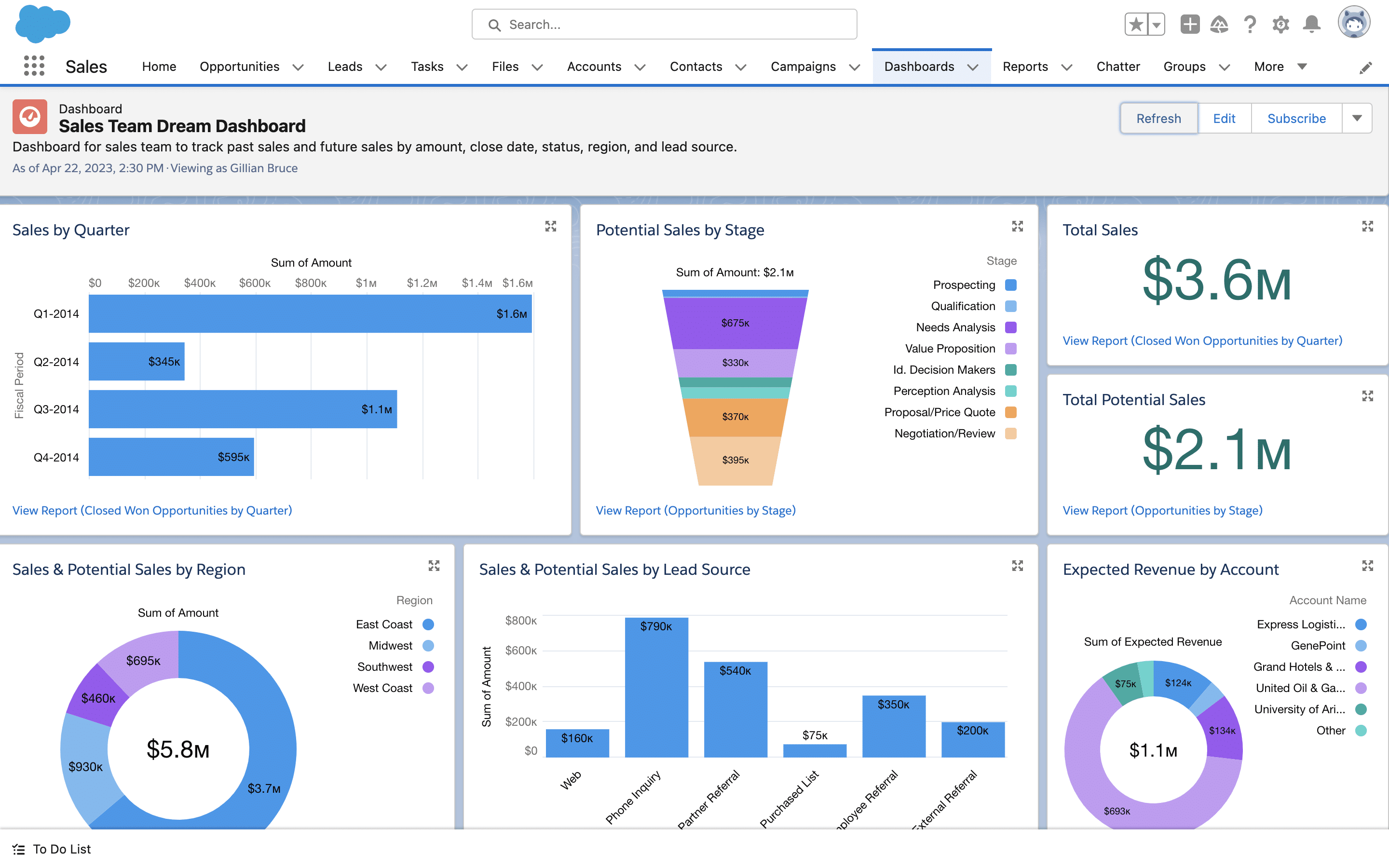
Salesforce CRM Pricing Plans
- Starter Suite – Starts at $25/user/month, billed monthly or annually. It includes simple CRM features like contact management, lead management and basic sales analytics, and is best suited for small teams.
- Pro Suite – Starts at $100/user/month, billed annually. Designed for SMBs with a broader set of tools to boost customer relationships.
- Enterprise – Priced around $165/user/month, and is billed annually. Includes advanced forecasting, pipeline management, and compatibility with external data sources and AI tools for sales automation.
- Unlimited – Starts at $330/user/month, billed annually. This plan offers a range of advanced tools such as intelligent automation, conversation intelligence, built-in AI features, and premium support.
AI capabilities
Some AI functionality is available in Pro Suite, Enterprise, and Unlimited plans, with additional features offered as optional add-ons. Advanced capabilities are provided through Einstein 1 — Salesforce’s AI-powered platform for its core applications, including Sales, Service, Marketing, Commerce, and Data Cloud.
Einstein 1 is priced at $500/user/month.
Ratings
- G2: 4.4
- Capterra: 4.4
See also: Salesforce Alternatives & Competitors and Salesforce Marketing Cloud Alternatives & Competitors
HubSpot
HubSpot CRM functionality is provided through its broader Customer Platform – a unified suite that covers marketing, sales, service, content, and operations. It provides core CRM functionality such as email marketing, ad management, contact and lead tracking, multi-channel customer support, and content management. Depending on the plan, a set number of paid users are included, with additional seats available at a monthly cost.
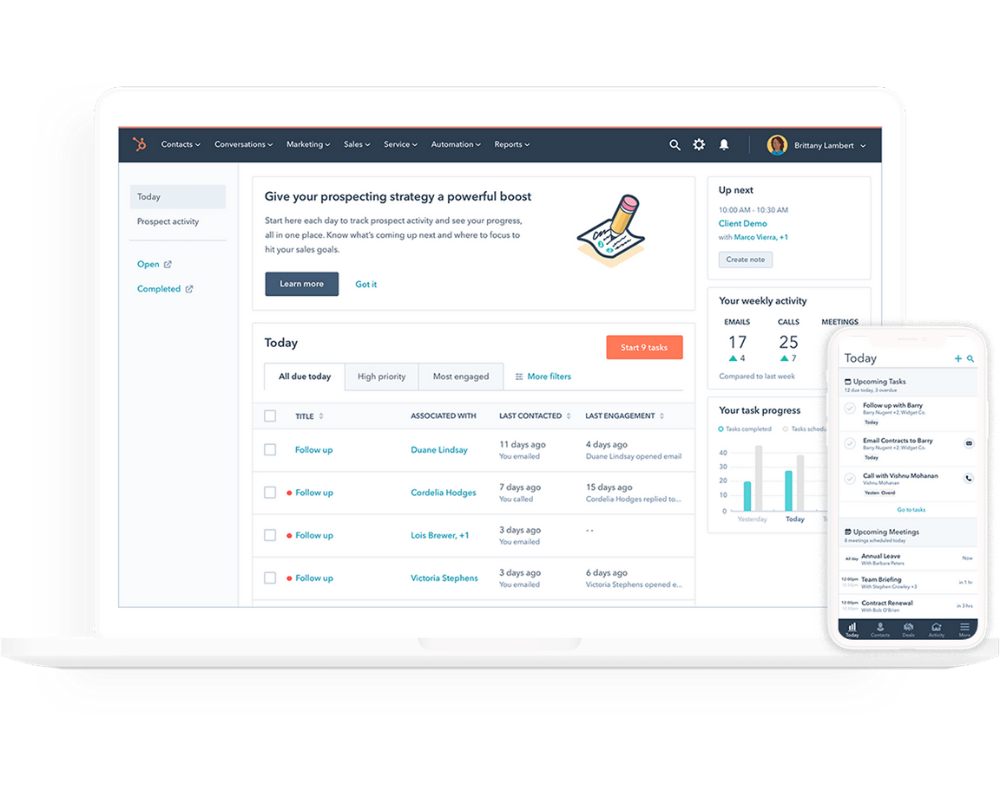
HubSpot Pricing Plans
- Starter – From $20 per seat/month, billed monthly or annually. Ideal for individuals and small teams, this plan includes basic features like marketing automation, calling, and simple pipeline tools.
- Professional – From $1,450/month (includes 5 seats; additional seats start at $50/month), billed monthly or annually. This pricing plan provides tools like custom field mappings, sales workspace, multi-channel ticket pipelines, campaign reporting, contact and deal scoring, and programmable automation.
- Enterprise – Starting at $4,700/month (includes 7 seats; additional seats start at $75/month), billed monthly or annually. This plan significantly expands on the Professional pricing plan, and also supports advanced features like custom objects, advanced permission controls, and tracking of custom events.
AI capabilities
HubSpot offers Breeze AI, a flexible AI tool for marketing, sales, and service. Pricing ranges from $30/month for 100 credits to $700/month for 10,000 credits, depending on the volume of AI-driven tasks.
Ratings
- G2: 4.4
- Capterra: 4.5
See also: Top 10 HubSpot Alternatives & Competitors
Zoho CRM
Zoho is a widely used customer relationship platform that supports full-cycle pipeline management. It offers a robust set of features—including marketing automation, sales forecasting, and task management—to help teams streamline operations and improve customer engagement.
Zoho CRM includes a free plan with limited functionality, allowing teams to explore the platform before upgrading. The Professional and Enterprise plans provide advanced customization and automation tools across both customer-facing and internal workflows. Additionally, Zoho’s AI assistant, Zia, enhances productivity through email and call analysis, next-best-action suggestions, predictive insights, and personalized recommendations.
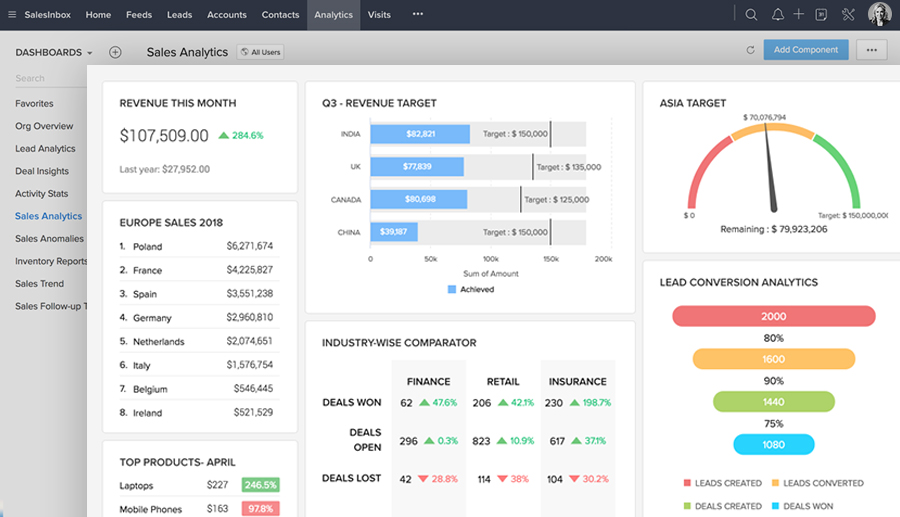
Zoho CRM Pricing Plans
- Standard – From $20/user/month. This pricing provides essential CRM features but with limited reporting and no AI functionality.
- Professional – From $35/user/month. Adds unlimited reports and dashboards, basic automation, email templates, inventory management, and basic support features.
- Enterprise – From $50/user/month. Offers advanced customization, process management and automation, AI-driven insights, and access to Zia’s full feature set.
- Ultimate – From $65/user/month. Includes all Enterprise features, plus enhanced storage, advanced analytics, and additional administrative controls—ideal for large-scale organizations
AI capabilities
Zoho’s AI assistant, Zia, is available in Professional (with limited functionality), Enterprise, and Ultimate plans.
Ratings
- G2: 4.1
- Capterra: 4.3
See also: Top 10 Zoho CRM Alternatives and Competitors
Microsoft Dynamics 365
Microsoft Dynamics 365 is a comprehensive suite of business applications that includes tools for CRM, as well as finance, HR, project operations, commerce, supply chain, and more. Its modular structure allows businesses to combine different tools on one platform, but each product, such as Sales, or Customer Service, is priced and billed separately.
Plans are billed annually, and most AI-driven features are only available in higher-tier plans starting at $100 per user/month. This can significantly increase overall costs for companies relying on AI capabilities.
Dynamics 365 Pricing Plans
For sales teams, Dynamics 365 offers the following plans:
- Sales Professional – $65/user/month. This plan includes core sales force automation, Microsoft 365 integration, basic reporting and dashboards.
- Sales Enterprise – $105/user/month: Supports advanced automation, contextual insights, and deeper customization.
- Sales Premium – $150/user/month: Provides all features from Enterprise plus prebuilt, customizable AI-powered tools for sales automation.
- Customer service teams can benefit from the following Dynamics 365 plans:
- Customer Service Professional – $50/user/month: The plan supports basic case management and self-service for straightforward scenarios.
- Customer Service Enterprise – $105/user/month: Provides AI-powered service tools and support for more complex service needs.
- Customer Service Premium – $195/user/month. This plan combines an integrated contact management center with AI-enhanced CRM capabilities.
There is no specific product for Marketing. However, to add some context to marketing-related processes, businesses can consider the Dynamics 365 Customer Insights (Journeys + Data) – $1,700/tenant/month (billed annually), which provides advanced marketing automation and customer data unification.
AI capabilities
Available primarily in the Enterprise and Premium plans across Sales and Customer Service. These include AI-generated insights, sales recommendations, and generative AI for service scenarios.
Ratings
- G2: 3.8
- Capterra: 4.4
Freshworks
Freshworks CRM is a customer relationship management platform offering a unified CRM for sales and marketing (Freshsales Suite) and a separate solution for customer service (Freshdesk). Its modular architecture allows enterprises to tailor CRM capabilities to their specific needs. With an intuitive interface and strong automation tools, teams can streamline workflows and improve customer engagement across multiple touchpoints.
A free version is available for up to 3 users to test the platform’s interface and basic features. Though it offers smooth CRM implementation and the core functionality to match the needs of growing businesses, it might not be the best fit for large enterprises with complex customization requirements.
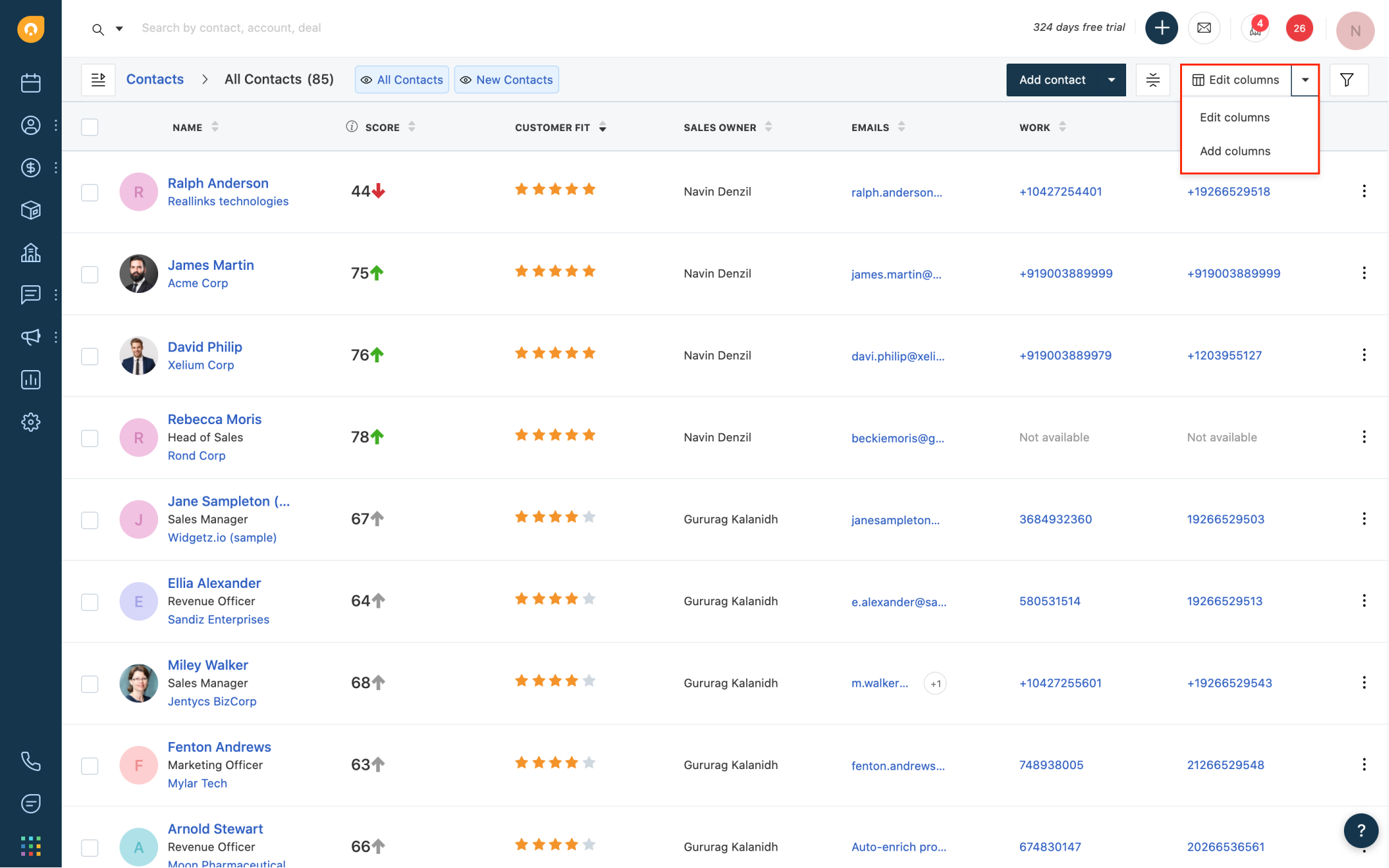
Freshworks’ Pricing Plans
The CRM pricing varies based on the products and functionality you need:
Sales and Marketing (Freshsales Suite):
- Growth – $9 per user/month (billed annually). Covers basic workflows like contact and engagement management but may require upgrades for advanced needs.
- Pro – $39 per user/month (billed annually). Includes basic Freddy AI features, multichannel sales pipelines, custom sales activities, and lead scoring.
- Enterprise – $59 per user/month (billed annually). Adds field-level permissions, forecasting insights with Freddy AI, audit logs, transactional emails, and more.
Customer Service (Freshdesk Omnichannel):
- Growth – $29 per user/month (billed annually). Offers omnichannel engagement, intelligent chatbots, and ticketing across web, SMS, email, and messaging platforms.
- Pro – $69 per user/month (billed annually). Adds support portals, custom objects, advanced ticketing workflows, and reporting.
- Enterprise – $109 per user/month (billed annually). Includes audit logs, approval workflows, skills-based assignments, and enhanced security.
AI capabilities
AI chatbot capabilities are integrated across all plans. Freddy AI agent (500 sessions, each next 1000 costs $100) and Freddy AI Copilot ($29 per agent/month) is available only for Pro and Enterprise Plans
Ratings
- G2: 4.5
- Capterra: 4.5
Pipedrive
Pipedrive is a user-friendly CRM solution with a strong focus on sales management. It offers a range of tools for contact and deal tracking, lead nurturing, email marketing and performance reporting to help improve customer engagement and sales efficiency. One of its standout features is the visual sales pipeline, paired with a drag-and-drop interface, which allows teams to easily customize workflows and track sales progress at a glance.
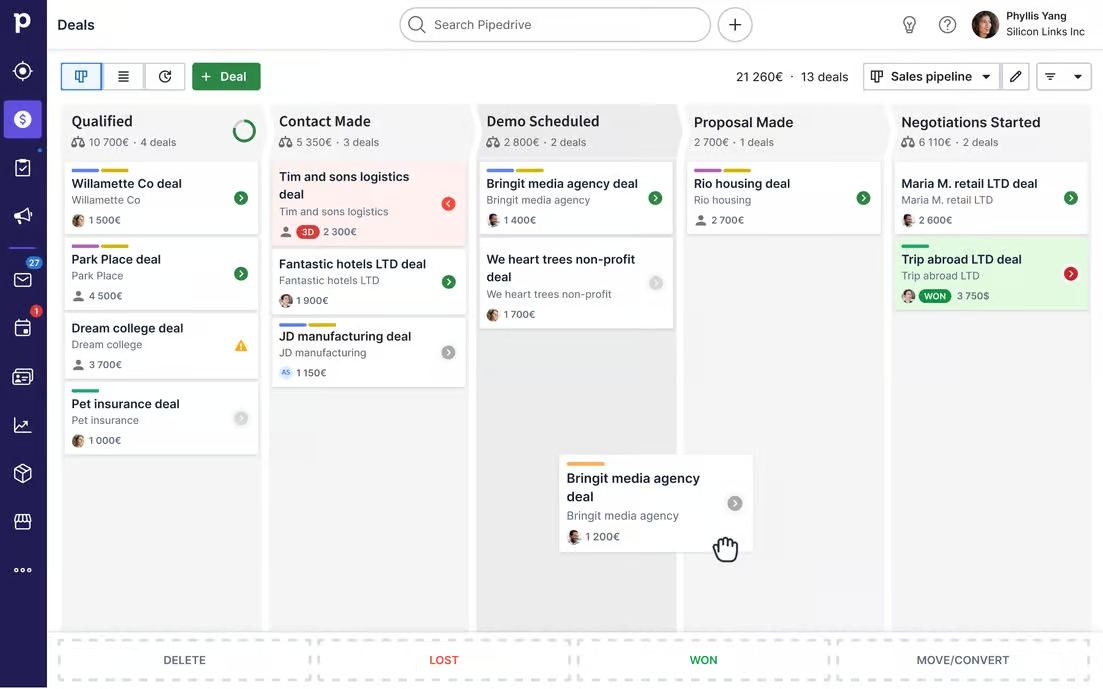
Pipedrive’s Pricing Plans
- Essential – $19 per seat/month. Includes basic sales features such as lead, pipeline, and calendar management, activity tracking, deal reporting, and personalized onboarding.
- Advanced – $34 per seat/month. Adds email tracking, workflow automation, scheduling tools for meetings and video calls, and live chat support.
- Professional – $64 per seat/month. The most popular plan, featuring AI-powered sales assistance, email tools, revenue forecasting, and custom field reporting.
- Power – $74 per seat/month. Designed for growing teams with project planning, team management, enhanced visibility controls, and priority support.
- Enterprise – $99 per seat/month. Offers unlimited customizations, advanced security, enhanced reporting, and extensive automation capabilities.
AI capabilities
Built-in AI tools offer personalized sales recommendations, automated email generation, and performance reporting to support smarter decision-making.
Ratings
- G2: 4.3
- Capterra: 4.5
LeadSquared
LeadSquared offers a robust set of tools for sales and marketing, primarily targeting mid-size and enterprise businesses. It supports unlimited contacts, core account and lead management features, and a wide range of tools for effective pipeline management. Its marketing automation suite includes workflow automation, email campaigns, lead tracking, and custom reporting. However, the marketing platform price starts at $1,200 per account for just 2 users, which, based on our CRM pricing comparison, is significantly higher than its market alternatives.
LeadSquared offers special pricing for startups and growing businesses, but there’s no free version available — only a demo.
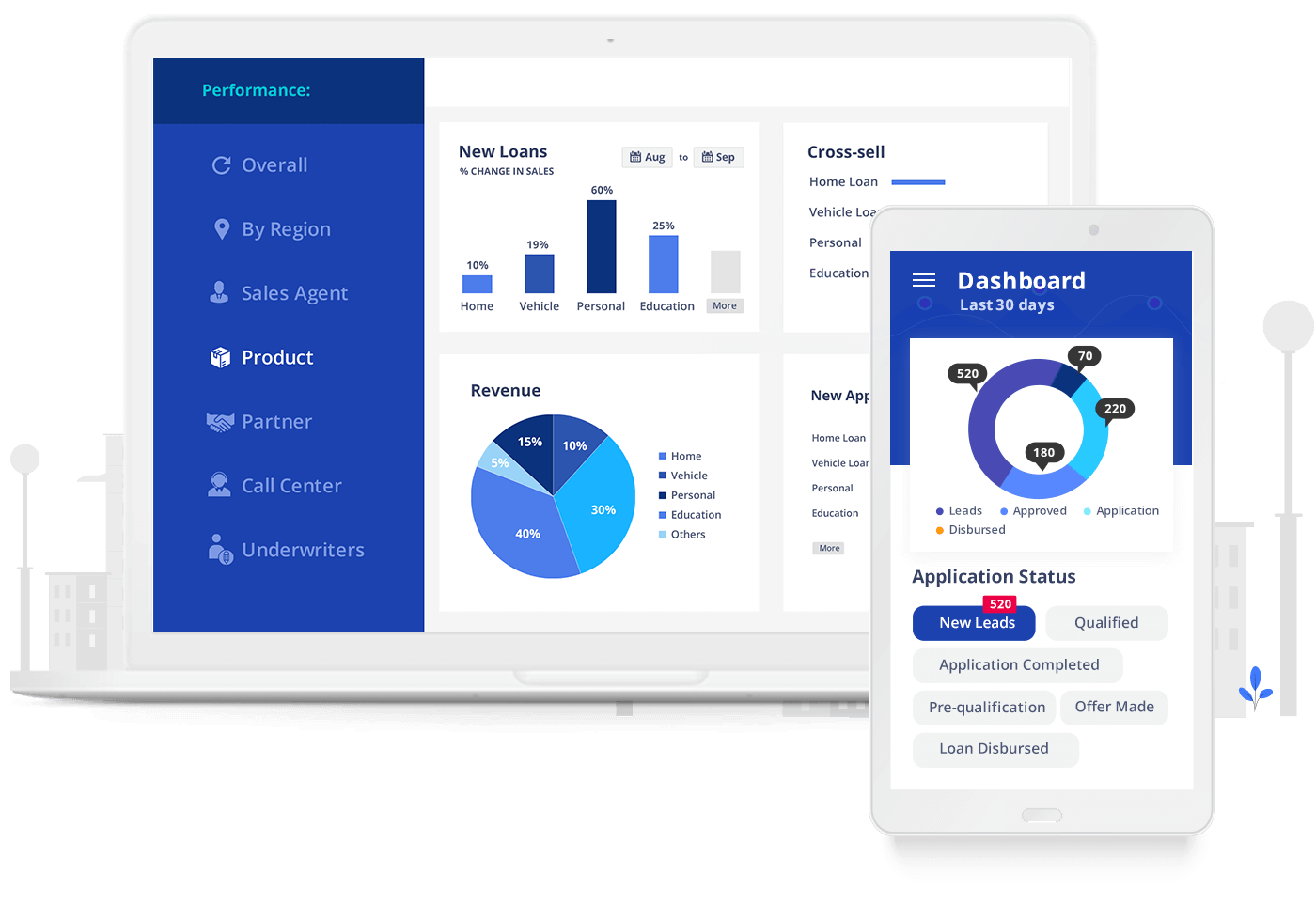
LeadSquared’s Pricing Plans
Sales CRM:
- Pro – $40 per user/month. Includes unlimited contacts, 2 GB base + 20 MB per user storage, and 2 custom reports per user.
- Super – $60 per user/month. Adds Mobile CRM functionality, AI-powered email parser, analytics platform, and access to the LeadSquared Application Development Platform.
Marketing Automation offers the following paid plans:
- Pro – $1,200 per account (for 2 users). Offers core tools for task management and basic automation for marketing processes.
- Super – $2,000 per account (for 2 users). Adds advanced features like website event tracking, analytics, and AI-powered email parsing.
AI capabilities
AI-powered tools are limited, and only included in the “Super” paid plan for email parsing.
Ratings
- G2: 4.6
- Capterra: 4.3
Zendesk
Though Zendesk is primarily designed for customer support teams, it still offers some CRM solutions, like Zendesk Sell, to enhance its customer engagement capabilities. Zendesk provides one platform to streamline sales and support communications, and offers tools for contact management, lead scoring, pipeline visibility, deal management and activity tracking to help teams streamline customer interactions.
The biggest drawback of the Zendesk platform is that it doesn’t provide end-to-end CRM functionality, particularly for marketing and some sales processes, which are integrated in popular CRMs like Creatio, HubSpot, or Salesforce.
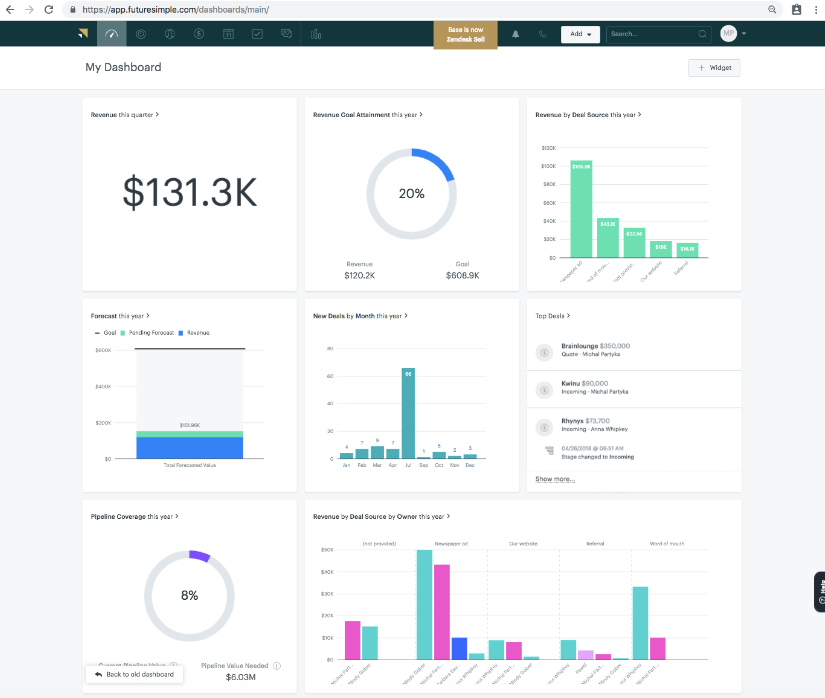
Zendesk Pricing Plans
- Support Team – $19 per agent/month. Provides basic capabilities for support operations such as a ticketing system, email tracking, contact management, and conversation history.
- Suite Team – $55 per agent/month. Includes all Support Team features, plus AI agents, proactive messaging, calls, and social messaging via WhatsApp, Instagram, Slack, and more.
- Suite Professional – $115 per agent/month. Features tools for advanced engagement such as a self-service portal, skills-based routing, and multiple ticket forms.
- Suite Enterprise – A custom solution tailored to specific workflows. Pricing for enterprise plans is available upon request.
AI capabilities
Most AI features are offered as paid add-ons, and some are only available in Suite Professional and Suite Enterprise plans:
- Copilot ($50 per agent/month) – Provides AI-powered tools to automate workflows and enhance problem-solving.
- Workforce Management ($25 per agent/month) – Automates forecasting, agent scheduling, and performance tracking.
- Quality Assurance ($35 per agent/month, billed annually) – Detects issues and coaching opportunities based on conversation analysis across human and AI agents. Available for all plans.
Ratings
- G2: 4.3
- Capterra: 4.4
Hidden CRM Costs to Watch For
Even if CRM seems affordable upfront, hidden costs can seamlessly inflate your total software spending. These extras can quickly push a low-cost platform into enterprise-level pricing:
- Data migration and setup fees – Some platforms charge extra to import your customer data or configure automated workflows, especially during the onboarding stage.
- Customization or consulting services – Advanced configurations often require expert assistance or vendor support, which can result in add-on hourly fees or packaged services.
- API limits or usage-based overages – Many CRMs charge for the number of API calls or integrations per month, and exceeding these limits can lead to surprise charges. For example, some platforms offer advanced features or AI functionality only as paid add-ons, forcing teams to either adjust their processes or pay extra to unlock the tools they need.
- Expensive per-seat licensing as teams grow – A platform that starts at $25/user can become costly at scale if your team expands or requires admin-only seats.
To avoid unexpected CRM costs, always review the vendor’s pricing documentation in detail, clarify any limits on CRM features or integrations, and make sure you understand exactly what’s included in your plan before committing.
What are the TCO and ROI Parameters in CRM Software?
According to a 2024 study by Nucleus Research, the average CRM delivers $3.10 in return for every $1 spent. While this figure is often cited to demonstrate the value of CRM systems, the real return is highly variable. Some businesses see a 10X ROI, while others struggle to realize any measurable benefit, wasting their time and budget.
A CRM’s profitability depends on how well the platform fits a company’s processes, how fully it’s adopted by teams, and whether the included features justify the overall cost. The two key metrics can help you to properly assess the CRM value: Total Cost of Ownership (TCO) and Return on Investment (ROI).
How to Calculate Total Cost of Ownership (TCO) of CRM Platforms
Total Cost of Ownership (TCO) refers to the complete cost of using a CRM system over time. This includes both:
- Direct costs: licenses, user fees, and vendor support
- Indirect costs: setup, data migration, customization, integrations, training, and ongoing maintenance
The higher your TCO, the more budget you'll need before the CRM becomes profitable. Understanding TCO businesses access the true financial impact of a CRM investment and compare options beyond surface-level pricing.
TCO Formula for CRM software:
TCO = Direct CRM costs + Indirect CRM costs
How to Calculate Return on Investment (ROI) in CRM
ROI measures how much business value a CRM generates compared to its total cost. This value can come from new revenue, cost savings, productivity gains, and higher customer retention.
ROI Formula for CRM software:
ROI = [(Revenue generated from CRM – Total CRM cost) / Total CRM cost] × 100
The higher the ROI, the more profitable the CRM is for your business. To maximize ROI, choose a platform that offers key features, like automation, AI, and analytics, without relying heavily on paid add-ons or third-party tools.
Choose the Right CRM Software That Meets Your Business Needs
There’s no universal price tag that defines the best CRM — what matters most is finding a solution that aligns with your business goals, supports your teams, and delivers long-term value. Instead of chasing the cheapest or most feature-packed platform, focus on what truly fits: the right functionality, scalability, ROI potential, and ease of integration.
At Creatio, we understand how important that fit is. That’s why our CRM offers a transparent, composable pricing model — allowing you to select only the features you need, while still benefiting from built-in AI, no-code tools, and a unified platform designed to grow with your business.
Ready to explore what Creatio can do for you?
Start your free trial or request a personalized demo today.





















































